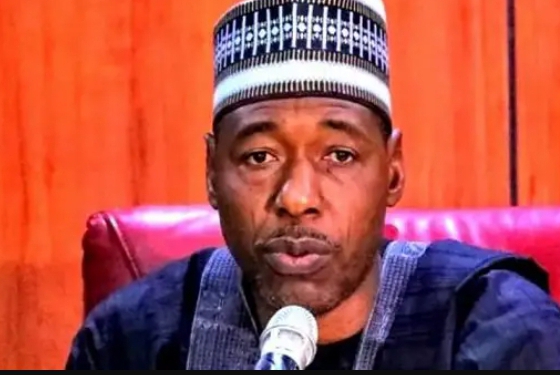Why North vehemently opposes Tinubu’s tax reforms – but it’s a pathway to economic progress
Femi OGUNLANA
Advertisement

President Bola Tinubu in September transmitted four tax bills to the National Assembly. The four bills are the Nigeria Tax Bill, the Nigeria Tax Administration Bill (NTAB), the Nigeria Revenue Service (Establishment) Bill, and the Joint Revenue Board (Establishment) Bill. The bills have passed second reading in the Senate. The Presidency has insisted the bills will rejig the taxation administration system in Nigeria and contribute to economic growth.
However, the bill is receiving much flak from some quarters including the Governors Forum, Northern Traditional Rulers and the Northern Elders Forum among others. The greatest opposition is indeed from the North, which fears if passed into law might jeopardize the economy of the region.

Governor Babagana Umara Zulum of Borno state said, “We condemn these bills transmitted to the National Assembly. They will drag the north backward, and not only the north, South East, South West, and some states in the South West such as Oyo, Osun, Ekiti, Ondo, will have problem with these bills.”
He added, “It is not opposition. This, based on our understanding, is something that will destroy the north in its entirety. Therefore, we call on President Bola Ahmed Tinubu and others to review this decision.
The North has been holding several meetings to truncate the passage of the bills and demanding their withdrawal.
While the bills are an ambitious attempt to improve revenue generation and put the country at a threshold of stronger pedestal economically, described as a “progressive taxation” by the deputy spokesman of the House of Representatives, Philip Agbese, the North is apprehensive they will pose existential challenges to the region economic-wise. Governor Zulum further stressed, “How we see it is, if these bills scale through, we will not be able to even pay salaries. And if we paid, it won’t be sustainable the following year.”
Advertisement
When asked whether the reforms could worsen hunger, poverty, and insecurity in the region, Zulum affirmed, saying “Including security. But they’re saying otherwise. We are against it, Lagos is against it; that it will drag it backwards. If this is the situation, then why won’t they rescind it? Our National Assembly members and even some from the Southern region are not in support of these bills.”
Philip Agbese further speaking on the issue asserted, “What FIRS has done in the past few years is commendable. Under the stewardship of Mr.Zaccheus Adedeji, the agency has been surpassing its revenue target.
“Do not forget that the FIRS collected a record N12.37 trillion in 2023, which was 10.7 per cent higher than its target of N10.7 trillion.
Advertisement

“Nigerians will appreciate this man very soon because when these bills are passed and the Federal Government has more money to spend, critical infrastructure will be developed. Jobs will be created, and to a great extent, poverty will be reduced.
“We don’t have many Adedejis in charge of government agencies. From the look of things, he is going to repeat the feat he pulled last year.
“The FIRS set a revenue target of N19.41 trillion for 2024. As of the end of September, it had already collected N18.5 trillion. What that tells us is that we will sing a new song at the end of the year.”
He added, “These bills are about Nigerians—from the top company executive to the farmer in a rural village.
“Public policy affects everyone. If passed into law, these bills will rejig the economy and ensure rapid development of critical infrastructure.”
He also commended President Tinubu for steering the country towards a progressive taxation system.
“Nigeria is going the way of progressive taxation. What this means is that if implemented, we will have a new tax regime that takes away the burden from poor Nigerians and small companies. It is a new thinking that will do us good.”
Advertisement
The provisions giving the jitters to the North
One of the provisions of the bills is a new value added tax (VAT) sharing formula. Presently, the sharing formula of VAT among states is 20% derivation (that is the state that generates the VAT will collect 20% of the revenue), 50% is shared equally among states, and 30% is shared based on size of population.
To put in another way, let us say N100m VAT is to be shared among states of the federation and let’s say it is Oyo state that generates the amount, Oyo state will get 20% (amounting to N20m), plus N1,351m (its share of the 50% to all states shared equally, i.e. N50m divided by 37 states) and then its share of the 30% based on population size, and in this way it is further short changed because many states that are larger than it will get more. In the end, from the N100m it generates it will get less than N30m. That is where the problem lies. Nyesom Wike fought this as governor of Rivers state instituting a legal case against it.
In the new VAT sharing model meanwhile, 60% (up from 20%) of VAT revenue for the states are shared on the basis of derivation while 20% (down from 50%) is shared equally among the states, then 20% (down from 30%) is shared based on population sizes. Using the above scenario again as an example, Oyo state will now get N60m (its share of 60%), N540, 000 on the basis of equally shared revenue, and the remaining 20% based on population will make up the rest, which will also be minimal. Based on this new model, the state will derive over N60m as against less than N30m in the existing model.
In addition, VAT revenue for the purpose of the new derivation model will no longer be attributed to the place of remittance (which is usually the headquarters of companies) but attributed to the actual locations across the states where the consumption of goods and services took place.
This is another headache for the North. As an instance, most states in the North because of the enactment of the Sharia Law have outlawed production of alcohol and its consumption (which generates plenty VAT) and so generates no VAT in this sector but based on the current sharing formula, they take the lion share of the VAT (which other states pay for) because of their larger population and greater number of states/local governments.
That’s considered a monumental cheat! But since they have always held the levers of power they ensure the adoption of this system to favour themselves. Yet, this does not translate to greater fortune or economic buoyancy in the region.
Advertisement

But it’s the way to go
Nonetheless, Nigeria needs to explore new strategies as in reforms if we must shake off lethargy and usher the country in ascendancy economically. We can’t continue to do things the same way and expect different results. Things might be hard presently, but those are results of the path we have been treading. To spark economic robustness and vibrancy we need to jettison the old way and explore new horizons one of which is reform in taxation regime. It has been stated, the new tax system, if enacted, will extinguish the complacency spirit that makes states rely majorly on federal allocations; it will instead stimulate a strong drive to develop the local economy and foster that spirit of competitiveness, greater prudence and accountability. Rather than seeing the new tax proposal as an attempt to cripple the economy of the North, it should be seen as a wake up call to look inward and chart new course (s) for economic regeneration.
Necessity they say is the mother of invention. Nigeria will remain redundant, failing to progress if we continue to adhere unbendably to the unproductive path that favours only a class of people. This new tax administration system will also drag the super rich into the tax net while relieving the common man in several ways according to some experts.
The bottomline is that we need new methods and strategies to reactivate the economy of the country for everybody’s good. But then, how the revenues are deployed is very important. Will they be increased revenue that will accrue be channeled into productive ventures or into private coffers? In the meantime, the North should not panic, it should rather transform into a productive economy harnessing its great potential instead of perpetually, indolently being a leech.





